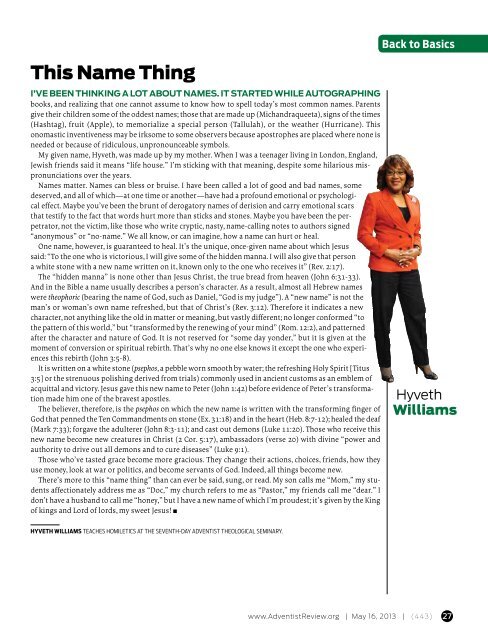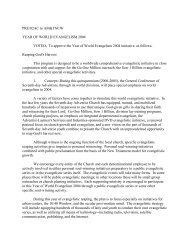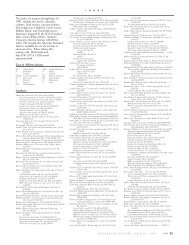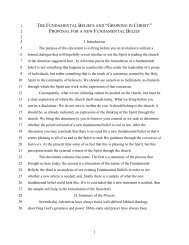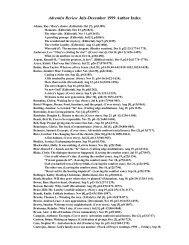Christ Kona?
Download PDF - Adventist Review
Download PDF - Adventist Review
- No tags were found...
Create successful ePaper yourself
Turn your PDF publications into a flip-book with our unique Google optimized e-Paper software.
Back to Basics<br />
This Name Thing<br />
I’ve been thinking a lot about names. It started while autographing<br />
books, and realizing that one cannot assume to know how to spell today’s most common names. Parents<br />
give their children some of the oddest names; those that are made up (Michandraqueeta), signs of the times<br />
(Hashtag), fruit (Apple), to memorialize a special person (Tallulah), or the weather (Hurricane). This<br />
onomastic inventiveness may be irksome to some observers because apostrophes are placed where none is<br />
needed or because of ridiculous, unpronounceable symbols.<br />
My given name, Hyveth, was made up by my mother. When I was a teenager living in London, England,<br />
Jewish friends said it means “life house.” I’m sticking with that meaning, despite some hilarious mispronunciations<br />
over the years.<br />
Names matter. Names can bless or bruise. I have been called a lot of good and bad names, some<br />
deserved, and all of which—at one time or another—have had a profound emotional or psychological<br />
effect. Maybe you’ve been the brunt of derogatory names of derision and carry emotional scars<br />
that testify to the fact that words hurt more than sticks and stones. Maybe you have been the perpetrator,<br />
not the victim, like those who write cryptic, nasty, name-calling notes to authors signed<br />
“anonymous” or “no-name.” We all know, or can imagine, how a name can hurt or heal.<br />
One name, however, is guaranteed to heal. It’s the unique, once-given name about which Jesus<br />
said: “To the one who is victorious, I will give some of the hidden manna. I will also give that person<br />
a white stone with a new name written on it, known only to the one who receives it” (Rev. 2:17).<br />
The “hidden manna” is none other than Jesus <strong>Christ</strong>, the true bread from heaven (John 6:31-33).<br />
And in the Bible a name usually describes a person’s character. As a result, almost all Hebrew names<br />
were theophoric (bearing the name of God, such as Daniel, “God is my judge”). A “new name” is not the<br />
man’s or woman’s own name refreshed, but that of <strong>Christ</strong>’s (Rev. 3:12). Therefore it indicates a new<br />
character, not anything like the old in matter or meaning, but vastly different; no longer conformed “to<br />
the pattern of this world,” but “transformed by the renewing of your mind” (Rom. 12:2), and patterned<br />
after the character and nature of God. It is not reserved for “some day yonder,” but it is given at the<br />
moment of conversion or spiritual rebirth. That’s why no one else knows it except the one who experiences<br />
this rebirth (John 3:5-8).<br />
It is written on a white stone (psephos, a pebble worn smooth by water; the refreshing Holy Spirit [Titus<br />
3:5] or the strenuous polishing derived from trials) commonly used in ancient customs as an emblem of<br />
acquittal and victory. Jesus gave this new name to Peter (John 1:42) before evidence of Peter’s transformation<br />
made him one of the bravest apostles.<br />
The believer, therefore, is the psephos on which the new name is written with the transforming finger of<br />
God that penned the Ten Commandments on stone (Ex. 31:18) and in the heart (Heb. 8:7-12); healed the deaf<br />
(Mark 7:33); forgave the adulterer (John 8:3-11); and cast out demons (Luke 11:20). Those who receive this<br />
new name become new creatures in <strong>Christ</strong> (2 Cor. 5:17), ambassadors (verse 20) with divine “power and<br />
authority to drive out all demons and to cure diseases” (Luke 9:1).<br />
Those who’ve tasted grace become more gracious. They change their actions, choices, friends, how they<br />
use money, look at war or politics, and become servants of God. Indeed, all things become new.<br />
There’s more to this “name thing” than can ever be said, sung, or read. My son calls me “Mom,” my students<br />
affectionately address me as “Doc,” my church refers to me as “Pastor,” my friends call me “dear.” I<br />
don’t have a husband to call me “honey,” but I have a new name of which I’m proudest; it’s given by the King<br />
of kings and Lord of lords, my sweet Jesus! n<br />
Hyveth<br />
Williams<br />
Hyveth Williams teaches homiletics at the Seventh-day Adventist Theological Seminary.<br />
www.AdventistReview.org | May 16, 2013 | (443) 27


